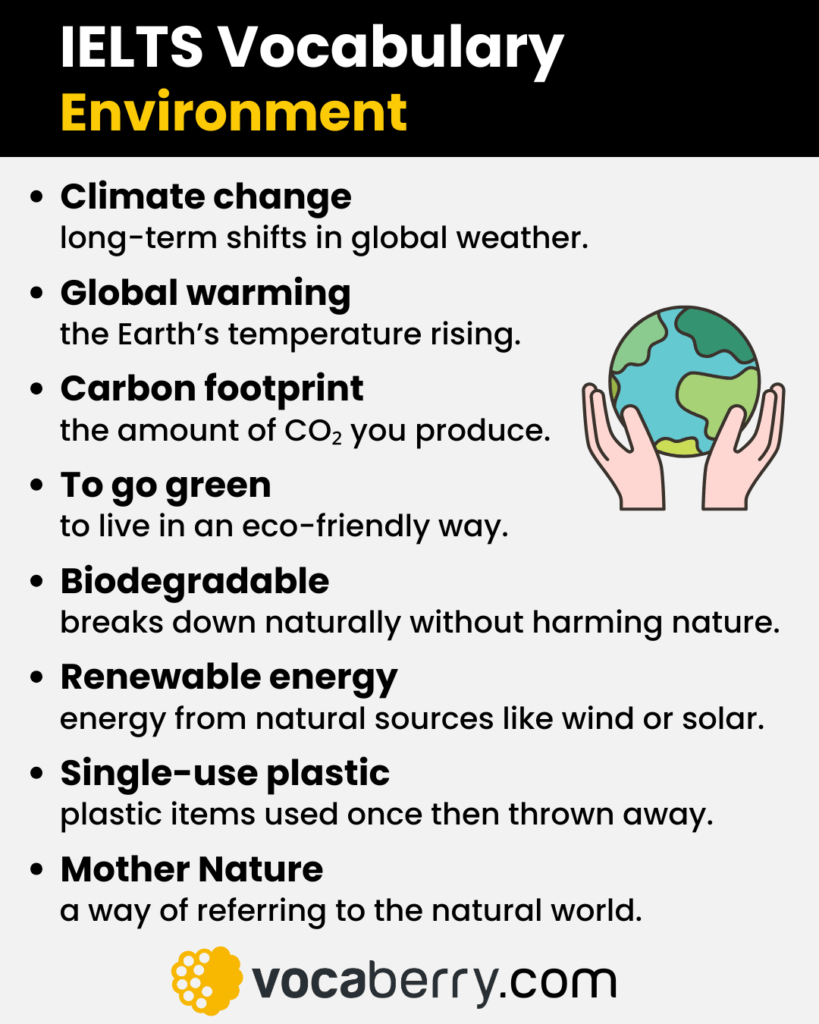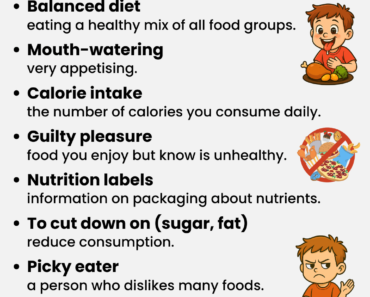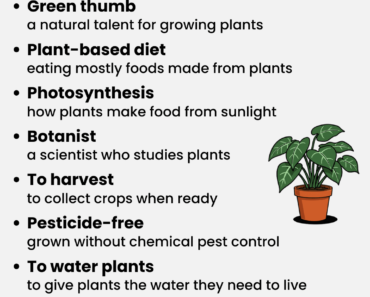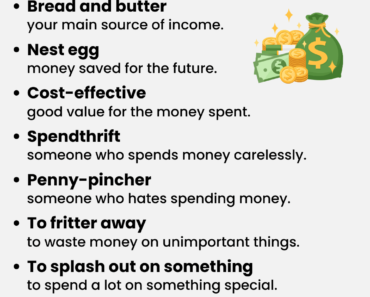
The environment is another common topic in the IELTS Speaking test. Examiners may ask you about pollution in your city, ways to protect the environment, or your opinion on global issues such as climate change. In this guide, you’ll find useful IELTS vocabulary for the environment with clear definitions, followed by IELTS Speaking Part 1, Part 2, and Part 3 questions with sample answers.
IELTS Vocabulary for Environment
Here is some useful IELTS vocabulary for talking about the environment with clear definitions. These words and phrases will help you give better answers in the IELTS Speaking test.
- Climate change – long-term shifts in global weather.
- Global warming – the earth’s temperature rising.
- Carbon footprint – the amount of carbon dioxide you produce.
- Carbon offsetting – reducing emissions by funding environmental projects.
- Carbon emissions – gases released by cars, factories, etc.
- Environmental footprint – the total effect humans have on the planet.
- Environmentalist – a person who protects the environment.
- Environmentally-friendly – not harmful to nature.
- Greenhouse gases – gases that trap heat in the atmosphere.
- Greenhouse effect – heat trapped in the Earth’s atmosphere by gases.
- Renewable energy – energy from natural sources like wind or solar.
- Alternative energy sources – energy like wind, solar, or hydro instead of fossil fuels.
- Biodegradable – able to break down naturally without harming the environment.
- Non-biodegradable – not able to break down naturally.
- Disposable products – items made to be thrown away after one use.
- Fossil fuels – coal, oil, and gas.
- Deforestation – cutting down forests.
- Reforestation – planting trees to replace lost forests.
- Deforestation-free products – goods produced without cutting down forests.
- Biodiversity – the variety of life in nature.
- Endangered species – animals or plants close to extinction.
- Extinct species – animals or plants that no longer exist.
- Wildlife habitat – natural home for animals.
- Habitat destruction – loss of natural homes for plants and animals.
- Contamination – pollution that makes something dirty or unsafe.
- Ecosystem – community of living things in an environment.
- Pollution – dirtying of air, water, or land.
- Air pollution – contamination of the atmosphere.
- Water pollution – dirty rivers, seas, and lakes.
- Air quality index (AQI) – a measure of pollution in the air.
- Waste management – controlling rubbish and recycling.
- Dumping ground – a place where waste is left.
- Landfills – large sites where waste is buried.
- Oil spill – leaking of oil into seas or oceans.
- Logging – cutting down trees for timber.
- Poaching – illegal hunting of animals.
- Recycling – turning waste into new materials.
- Recyclable – able to be processed and reused.
- Single-use plastic – plastic items used once then thrown away.
- Zero-waste lifestyle – way of living that produces no waste.
- Sustainable lifestyle – living in a way that protects the environment.
- Sustainable consumption – using resources responsibly to protect the future.
- Carbon-neutral – not adding extra carbon dioxide to the atmosphere.
- Energy-efficient – using less energy to perform the same task.
- Eco-friendly – not harmful to the environment.
- Conservation – protecting the environment.
- Conservationist – a person who works to protect nature.
- Sustainable development – progress without harming the future.
- Sustainable agriculture – farming that protects the environment.
- Eco-tourism – responsible tourism that protects nature.
- Off-the-grid – living without public electricity or water supply.
- Green initiatives – projects to improve the environment.
- Environmental awareness – understanding the need to protect nature.
- Natural resources – materials from nature like water, minerals, trees.
- Renewable resources – materials that can be replaced naturally.
- Non-renewable resources – materials that cannot be replaced quickly.
- Overpopulation – too many people for the environment to support.
- Urbanisation – growth of cities into natural areas.
- Environmental degradation – damage to the natural environment.
- Desertification – land turning into desert due to overuse or climate change.
- Ocean acidification – when oceans absorb CO₂ and become more acidic.
- Melting of glaciers – ice sheets turning into water.
- Rising sea levels – increase in ocean levels caused by climate change.
- Loss of biodiversity – decline in the variety of species.
- Illegal dumping – throwing away waste unlawfully.
- Extreme weather events – severe conditions like floods, hurricanes, or droughts.
- Chemicals and fertilisers – substances used in farming that may harm nature.
- Rich in natural resources – having plenty of minerals, forests, or energy sources.
- Ozone layer depletion – thinning of the ozone layer.
- Man-made disaster – environmental damage caused by humans.
- Climate resilience – ability to adapt to climate change impacts.
- Water scarcity – lack of fresh water for people’s needs.
- Mother Nature – a way of referring to the natural world.
- To get back to nature – to spend time in a natural environment.
- To litter – to throw rubbish in public places.
- To become extinct – when a species disappears forever.
- To dry up – when water sources disappear.
- To be under threat – to be in danger.
- To die out – to disappear completely.
- To contaminate – to pollute or make something impure.
- To reduce our carbon footprint – to lower the CO₂ we produce.
- To contribute to global warming – to add to climate change.
- To combat climate change – to take action against global warming.
- To have a green thumb – to be good at gardening.
- To go green – to live in an eco-friendly way.
- To go solar – to use solar energy.
IELTS Speaking: Environment Questions & Answers
In this section, you’ll find IELTS Speaking Part 1, Part 2, and Part 3 questions on the environment with sample answers. These examples show how the environment vocabulary can be used in your responses during the test.
IELTS Speaking Part 1 – Environment
Are there any environmental problems in your hometown?
Yes. In winter we often have air pollution because of traffic that runs on fossil fuels. The Air quality index sometimes spikes, so people wear masks or avoid going out early in the morning.
What do you do to help the environment in your daily life?
I try to reduce my carbon footprint by taking the bus and carrying a reusable water bottle instead of using single-use plastic. At home we sort waste for recycling and choose energy-efficient appliances.
Do you think people should use public transport more?
Definitely. More buses and trains would cut carbon emissions and make cities more environmentally-friendly. It also supports sustainable development by reducing congestion and noise.
Have you ever joined any environmental activities?
Yes, I joined a tree-planting day that supported reforestation and a weekend beach clean-up to fight illegal dumping. It raised my environmental awareness and made me more careful about waste management.
What is your opinion of renewable energy?
I’m a big supporter of renewable energy. If I owned a house, I would go solar because it lowers carbon emissions and reduces reliance on non-renewable resources.
IELTS Speaking Part 2 – Environment Cue Card
Describe an environmental problem you think is important.
You should say:
- what it is
- how it affects people and nature
- what has caused it
- and explain why it is important to solve it.
Sample Answer:
I’d like to talk about air pollution, which is a serious issue in many big cities, including mine. On some days, the air quality index goes so high that you can literally see a haze hanging over the streets. People wear masks or avoid going out in the morning when traffic is at its worst.
The main cause is our heavy reliance on fossil fuels. Most cars, buses, and even factories still run on petrol or coal, which release a huge amount of carbon emissions and greenhouse gases. This doesn’t just damage the atmosphere; it also affects people’s health. I know quite a few people who suffer from asthma or breathing problems, and doctors often say it’s linked to long-term exposure to polluted air.
Nature also suffers. Acid rain, for example, caused by air pollution, damages soil and water systems, and it even threatens biodiversity by harming trees and wildlife. It’s a clear example of how human activities are putting Mother Nature under pressure. Sometimes I feel our city is turning into a bit of a dumping ground because of traffic fumes, factory smoke, and even illegal dumping from industries.
I think solving this problem is extremely important because it directly affects our quality of life. If governments invested more in renewable energy and eco-friendly public transport, like electric buses or trains, we could reduce carbon footprints significantly. Even switching to energy-efficient appliances at home or encouraging people to follow a sustainable lifestyle would make a difference. Personally, I’ve tried to go green by cycling short distances instead of driving, and I also avoid single-use plastic whenever I can.
For me, air pollution is not just a local problem but a global challenge. It plays a huge role in the melting of glaciers and rising sea levels, which are already affecting countries worldwide. If we don’t tackle it now, it will continue to contribute to global warming and put future generations at risk. That’s why I believe improving air quality and promoting sustainable development should be top priorities for every country.
IELTS Speaking Part 3 – Environment Discussion
IELTS Speaking Part 3 questions about the environment often ask you to discuss environmental problems, compare solutions for protecting nature, and give opinions on global challenges like deforestation, waste management, and renewable energy.
Do you think governments are doing enough to protect the environment?
I don’t think so. While there are green initiatives and campaigns about renewable energy, the pace of change is too slow compared to the scale of climate change. Many governments still rely heavily on fossil fuels, which keeps increasing carbon emissions. I believe stricter policies on waste management and illegal dumping are necessary, but at the same time, countries should invest more in sustainable development so that economic growth doesn’t come at the expense of the planet.
How can individuals contribute to solving environmental problems?
Individuals can make a big difference by changing daily habits. For instance, choosing energy-efficient appliances, avoiding single-use plastic, and supporting eco-friendly products can reduce personal ecological footprints. People can also take part in activities like reforestation or local clean-up campaigns, which raise environmental awareness. Of course, one person alone can’t stop global warming, but if enough people adopt a sustainable lifestyle, the collective impact could be significant.
What impact does overpopulation have on the environment?
Overpopulation puts enormous pressure on natural resources like water, land, and energy. It often leads to deforestation, more urbanisation, and greater amounts of waste ending up in landfills. This not only accelerates the loss of biodiversity but also worsens air pollution and water scarcity. Unless governments promote better planning and encourage a balance between growth and conservation, the situation will continue to deteriorate.
How do you think climate change will affect future generations?
Future generations will face more extreme weather events such as floods, hurricanes, and droughts. The melting of glaciers and rising sea levels could displace millions of people from coastal areas. At the same time, desertification and ocean acidification will threaten food security and ecosystems. Unless we combat climate change now, our children may inherit a world with fewer resources, damaged ecosystems, and a much lower quality of life.
Why is it important to protect endangered species?
Protecting endangered species is crucial because each animal or plant plays a role in maintaining the balance of the ecosystem. If they become extinct, it can trigger a loss of biodiversity, which affects food chains and even human survival. For example, the disappearance of bees due to pollution or pesticides could harm agriculture. Beyond that, protecting wildlife also reflects our environmental awareness and moral responsibility to preserve Mother Nature for future generations.
More IELTS Vocabulary Topics
If you found this lesson useful, explore other IELTS Speaking topics to expand your vocabulary and practice with sample answers:
- IELTS Vocabulary: Accommodation
- IELTS Vocabulary: Advertisement
- IELTS Vocabulary: Animals
- IELTS Vocabulary: Art
- IELTS Vocabulary: Artificial Intelligence
- IELTS Vocabulary: Books
- IELTS Vocabulary: Childhood
- IELTS Vocabulary: Crime and Punishment
- IELTS Vocabulary: Culture and Traditions
- IELTS Vocabulary: Daily Routine
- IELTS Vocabulary: Education
- IELTS Vocabulary: Family
- IELTS Vocabulary: Fashion and Clothes
- IELTS Vocabulary: Films
- IELTS Vocabulary: Food & Diet
- IELTS Vocabulary: Friends
- IELTS Vocabulary: Gifts
- IELTS Vocabulary: Health
- IELTS Vocabulary: Hobbies
- IELTS Vocabulary: Hometown
- IELTS Vocabulary: Money
- IELTS Vocabulary: Museums
- IELTS Vocabulary: Music
- IELTS Vocabulary: Plants
- IELTS Vocabulary: Shopping
- IELTS Vocabulary: Social Media
- IELTS Vocabulary: Sports
- IELTS Vocabulary: Technology
- IELTS Vocabulary: Transport
- IELTS Vocabulary: Travel
- IELTS Vocabulary: Weather
- IELTS Vocabulary: Work & Jobs






